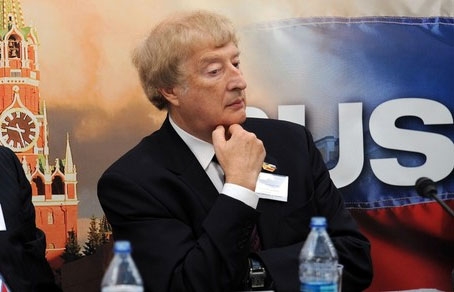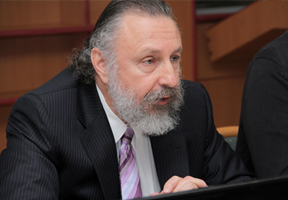
 Those in the United States beating the drums for a
new Cold War with Moscow have nailed the scalp of yet another desperado to
their trophy wall. His arsenal reportedly features such deadlydevices as the
Yugoslav Attack, the Queen’s Gambit, and the dreaded Sicilian Defense, Dragon
Variation.
Those in the United States beating the drums for a
new Cold War with Moscow have nailed the scalp of yet another desperado to
their trophy wall. His arsenal reportedly features such deadlydevices as the
Yugoslav Attack, the Queen’s Gambit, and the dreaded Sicilian Defense, Dragon
Variation.
Those in the United States beating the drums for a new Cold War with Moscow have nailed the scalp of yet another desperado to their trophy wall. His arsenal reportedly features such deadlydevices as the Yugoslav Attack, the Queen’s Gambit, and the dreaded Sicilian Defense, Dragon Variation.
In other words, Weapons of Chess Distraction.
On August 25, Kirsan Ilyumzhinov, since 1995 President of FIDE (la Fédération Internationale des Échecs, or the World Chess Federation),was barred from boarding a plane from Moscow to New York. Slapped on a sanctions list by the Treasury Department’s Office of Foreign Assets Control(OFAC) in 2015 for allegedly "materially assisting and acting for or on behalf of the Government of Syria” and related entities, Ilyumzhinov – a Buddhist and former head of state of the Russian region of Kalmykia (roughly equivalent to a U.S. state governor) – had hoped to take part in preparations for a match between Russian Sergey Karjakin and Norwegian world champion Magnus Carlsen.Prior to his planned departure, Ilyumzhinov had written to OFAC offering to come to Washington to hand-deliver documentation refuting the claims against him.
While rejecting his wish to travel to the United States, OFAC replied that it is prepared to receive any documents Ilyumzhinov may submit under a pending request for reconsideration. Meanwhile, it is hard to escape the impression that Ilyumzhinov’s blacklisting is more political and perhaps personal than the formal OFAC designation suggests.
People who today are too young to remember may not appreciate how vividly world chess competition figured in the first Cold War between the United States and the then-Soviet Union.The 1972 "Match of the Century” between American Bobby Fischer and the USSR’s Boris Spassky and abortive attempts to pit Fischer against Soviet Anatoly Karpov in 1975 assumed the air of proxy duels between the two countries and their ideologies. The defections of top-level Soviet Grandmasters Viktor Korchnoi in 1976 and Lev Alburt in 1979 were big news. The 1984-85showdown between Karpov and fellow Soviet Garry Kasparov was widely hailed as a clash betweencommunist conformity versus the rising forces of reform, though both were members of the Communist Party.
Kasparov, today a sharp detractor of Russia and foe of President Vladimir Putin, has a long history of discord with FIDE. In 1986, he started a group called Grandmasters Association, challenging FIDE’s dominance. In 1993, he cofounded another group, the Professional Chess Association, which organized alternative matches to those of FIDE but disbanded in 1996.Later, calling his break with FIDE "the worst mistake of my career,” Kasparov ran for FIDE’s presidency in 2014, only to be defeated by incumbent Ilyumzhinov by a vote of 110 to 61 amid an acrimonious atmosphere not usually associated with the staid and dignified game.
Personal rivalries aside, it’s clear Kasparov and Ilyumzhinov are at odds politically. Kasparov condemns Putin as a dictator who "needs wars” to stay in power. He is especially critical of Syrian President Bashar al-Assad and Russia’s support for him, saying Putin’s goal in that county is "chaos.”He regards U.S. sanctions against Ilyumzhinov, whom he calls a Putin agent, as the FIDE chief’s finally getting his comeuppance. (It should be noted that Ilyumzhinov is not under EU sanctions and travels freely except to the U.S.)
By contrast, Ilyumzhinov is a strong proponent of chess as a nonpolitical tool of diplomacy. Soon after taking the helm at FIDE, he scheduled a world championship in Iraqi President Saddam Hussein’s Baghdad, then under sanctions. In June 2011, during the air war against Libya, Ilyumzhinov showed up in the capital, Tripoli, and metPresident Muammarel-Qaddafi, who reportedly asked him to deliver to the NATO powersan offer to hold a constitutional referendum to end the war.
"Everybody who supports chess is my friend,” Ilyumzhinov has said, proudly displaying pictures of himself with the Dalai Lama, the pope, and Syrian president Bashar al-Assad, whom he visited in May 2012. As onetime defector Grandmaster Alburt, now a U.S. citizen, has written in support of Ilyumzhinov’s efforts to use chess as a bridge between foes: "FIDE has achieved a level of harmony many other organizations can only dream of. Kirsan brought together, at least for chess purposes, the heads of Armenia and Azerbaijan.With Israelis in top FIDE positions, Kirsan organized a World Champion in Libyaand in Iran, and tried to help heal relations between Ukraine and Russia (his own status as a former head of state, Kalmykia, certainly helps). Kirsan brought the Women’s World Championship to Lviv, to the great satisfaction of his friend, Ukrainian President Petro Poroshenko.”
The upcoming New York match between Russia’s Karjakin (26) and Norway’s Carlsen (25) itself has a bit of the old Cold War thriller aspect. Both are former child prodigies who achieved Grandmaster status at an early age, at 12 and 13 years respectively. Karjakin is from Crimea, which controversially separated from Ukraine and joined Russia in 2014, a development disputed by most of the world. He is an outspoken Russian patriot and Putin supporter: "I ally myself entirely with Russia because Crimea, as we know, has transferred to Russia,”he explained to RFE/RL. "I am actually extremely happy about this because I always considered myself Russian. I speak Russian, think in Russian, so I'm entirely a Russian person, and entirely support Russia as a state.” Of Putin, Karjakin said: "I absolutely support him in everything he does.” Carlsen’s countryman is Jens Stoltenberg, currently Secretary General of NATO and former Norwegian prime minister, and a fierce critic of what he calls Putin’s "aggression,” particularly over the status of Karjakin’s native Crimea.
At a time when the entire Russian Paralympics team has been banned from competition in Rio, and the Russian Olympic team drastically pared down over what some regard as political motives, and tennis great Maria Sharapova hit with an unfair game of "gotcha,” it is hard to rule out thatanti-Russian politicization has now spread to chess. Is Ilyumzhinov’s "real” offense what is cited in the OFAC notice or because of his photo ops with Hussein, el-Qaddafi, and al-Assad – and Putin?
Certainly there is precedent for suspecting the latter. Let’s remember the fate of Bobby FischerKasparov has expressed admiration. Fischer fled the United States to escape a criminal indictment, finishing his life an exile from his own country. What was the politically motivated"crime” for which this undoubted genius, theAmerican "Mozart of chessIn 1992, he played a match in Belgrade, Serbia, then under sanctions.
By Edward Lozansky and Jim Jatras
 Edward Lozansky is president of the American University in Moscow, Professor of Moscow Sate and National Research Nuclear Universities
Edward Lozansky is president of the American University in Moscow, Professor of Moscow Sate and National Research Nuclear Universities
 Jim Jatras is a former U.S. diplomat and former foreign policy adviser to the Senate GOP leadership
Jim Jatras is a former U.S. diplomat and former foreign policy adviser to the Senate GOP leadership



.jpg/250px-ElbeDay1945_(NARA_ww2-121).jpg)





